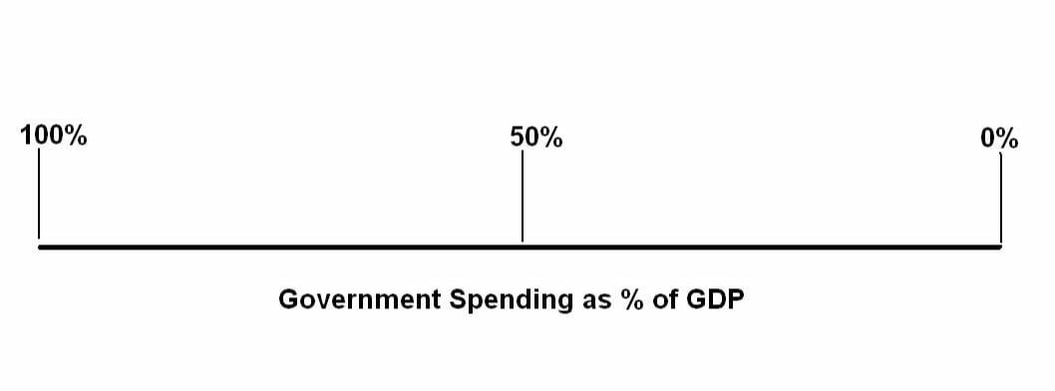|
It’s pretty darned rare for me to write a Blog about Macroeconomics but with all the Brexit turmoil and the fears of a Labour Government run by Jezza Corbyn and his Marxist buddies, I thought it was a good time to write a Blog about a very simple Economic Concept that I suspect very few People really understand and it might make Readers think about what the various Political shenanigans might really mean for Economic Growth and how our Society is managed (or mis-managed most of the time !!). And of course that could impact on our Investments.
I guess it is from being one of ‘Thatcher’s Babies’ that my interest in Economics was first ignited and back in those days in the late 1970s and for most of the 1980s the Economic Debate was very much at the forefront and it is only in more recent times in the ‘Goldilocks’ years (‘not too hot and not too cold‘) of the 1990s and up to the Credit Crunch in 2008 that Economics rarely seems to get much proper coverage in the Media and I wouldn’t be surprised if many People just latch onto Left Wing and Right Wing Politicians on the basis of them being ‘Nasty’ Individuals or ‘Nice’ ones. Of course it really is not that simple and Political choices along the lines of ‘Left’ or ‘Right’ imply very different ways to organise Society and the Economic Structure and the Freedom or not of the Individual. Hopefully this Blog will help explain in a very simple way what the Political slants of Left and Right really mean in terms of a National Economy.
Fortunately for me (because I really enjoy it - yes, I know that is weird) I was able to study Economics within my Business Studies College period and it was also a big part of my Business Studies Degree - although I must admit I got pretty bored with the detailed Supply and Demand Curves that our truly obsessive Lecturer used to repeatedly force us to endure. He also had chronic B.O. which we had to endure but that is another unpleasant story for another day (sorry Martin, I am sure you could do without the reminder !!).
In terms of my Stockmarket mucking about, Economics is of varying uses but I don’t subscribe to this idea that Macroeconomics is a total irrelevance and something that can be totally ignored. To a large extent much of it is just ‘Noise’ and you can disregard it but when we have hugely significant things like Brexit and in particular a possible Corbyn Government it is very useful to be able to grasp the likely Benefits and Dangers of such momentous changes. In more normal times, you simply need to keep a wary eye on various Economic Numbers and just be on the look out for potential upcoming Recessions - these are thankfully rare but can do a huge amount of damage to your Portfolio and we are discovering that fears of a Recessionary Environment as a result of a Shock ‘No Deal’ Brexit are certainly making the Markets choppy and difficult to navigate. Another major aspect of the Brexit Debate is the role of Regulation in an Economy and I will touch on this later in the Blog Series, but my focus initially is on the simple idea of what Percentage of a Nation’s GDP (Gross Domestic Product) is spent by the Government (note, this is a bit different to the % of GDP that is ‘Controlled’ by the Government but for our requirements we can ignore this for now. Look it up on Google if you are that intrigued !!) and I intend to go on to explain the implications of differing levels of State Spending and some other related stuff. To an extent these Blogs will be an Introduction to Macroeconomics which Readers might find useful as it is something that rarely gets covered by the usual Investing Press etc. The Spectrum At a theoretical level the Spectrum of how an Economy is ‘organised’ is simply a Straight Line as shown below:
This then leads us on to 3 very basic and simplistic Definitions as follows (note, these are my Definitions, you will find Textbook and Wikipedia ones may be very different but I am trying to keep this easy for your poor tired brains):
Of course in practice these are all silly Definitions because they would never happen (except perhaps the 50% but more often than not that Number is passed as the level of State Spending increases or decreases). For example, back at the height of the USSR (United Soviet Socialist Republics) when you account for Black Market activities and stuff the State probably only got up to around 70% of GDP being spent by all those Bureaucrats - it is very hard to make Humans do anything they don’t want to do !! A Fully Free Market could never really happen - there has to be some level of State Spending and Control to enable a Nation’s Economy to function - as a bare minimum you would probably need a Police Force and an Army for Defence of the Realm and of course the administration even around these would be considerable. This is an extreme example but even in this pretty much impossible scenario I suspect the State would still control 10% or so of GDP. Look at some dump like Somalia if you want to see what happens when the State is tiny and there is no effective kind of Government. Things like Health Spending, Welfare, Pensions, Education, Street Lights, Bin Collections etc. etc. could all be provided by the Private Sector and across many different Countries we see this in practice. The obvious example is that in the UK the vast majority of Health Spending is undertaken by the NHS (National Health Service) whereas in the US there is little State Provision of Healthcare and the vast majority is done by the Private Sector under an Insurance based system (although the State does get involved in Funding via Medicare for people with little financial resource of their own). Even in the UK now where Councils have gone to Fortnightly or 3-weekly Bin Collections, there are Private Contractors stepping in and offering Bin pick-ups every week and many People are paying to do this because they hate the Rats !! Ah, the power of the Market system….. This is in essence what a Mixed Economy is - it is neither Communist nor Fully Free Market and it is really a consideration of whereabouts along the Spectrum the % of Government Spending falls. Socialist Governments like the kind of thing Corbyn wants to make us all suffer could easily be up around 50% to 60%, whilst the kind of ‘Socialism’ that Tony Bliar was foisting upon us was around 45% and more in line with current EU averages. At the other end of the Mixed Economy Spectrum you have the Thatcher Governments from the late 1980s when it got down to 34% and it is no surprise to me that this created a much more dynamic Economy but of course it put a huge amount of pressure on Public Services. However, I would contend that the issues we have around Public Services even at the moment are more about Government Spending Priorities and Allocations rather than the absolute level of GDP the Government spends - it is the usual simplistic and false argument of ‘The Left’ that more Money is always needed whereas in fact it is far better to spend scarce Money on the right things and in efficient ways. Any idiot can just lob Money at a problem but it does not guarantee a better outcome - in fact, you probably get the opposite effect (and without doubt it reduces and stifles the efficiency within the overall Economy). This probably explains why no Left Wing Government has ever managed to successfully run an Economy over a sustained period - unless of course it is propped up by another State such as Cuba being backed by Russian Money. Even China has had to shift to a more dynamic Market-based System and their Government is probably ‘Communist’ in name only. That’s it for Part 1. In the next bit we will look at the implications arising from the different ways of organising an Economy and the levels of State Spending and the way I envisage things at the moment, Part 3 will include a chunk on the kinds of levels of State Spending that various Countries have. Regards, WD.
0 Comments
Leave a Reply. |
'Educational' WheelieBlogsWelcome to my Educational Blog Page - I have another 'Stocks & Markets' Blog Page which you can access via a Button on the top of the Homepage. Archives
May 2024
Categories
All
Please see the Full Range of Book Ideas in Wheelie's Bookshop.
|



